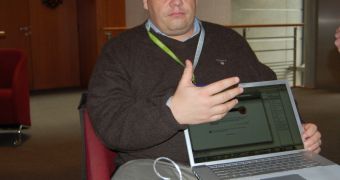This week, we got a chance to sit down and chat with the President of Mozilla Europe, Tristan Nitot. During his speech at Net Camp (Howard Johnson Bucharest Hotel, Bucharest, Romania), Nitot pleaded for open environments and less egocentric development in order to have a better, and faster-growing Internet.
Following the event, Mr. Nitot went deeper into the concept of Open Source, telling us that “money is not the goal, it's the tool. Firefox is just a tool so that the web is a better place.” The man strongly believes that big companies should act pretty much in the same way. But how can Apple (with Safari) and Microsoft (with Internet Explorer) throw it all out the window when they can throw the browser in with the OS? In Nitot's opinion, this provides a huge advantage that Mozilla didn't benefit from, yet made it to 20% market share worldwide with just 200 dedicated staffers. Flipping open his shiny MacBook Pro, Nitot went to show us that, in Indonesia, Firefox has actually beaten Microsoft's Internet Explorer with well over 50 percent market share. In Poland and Slovenia, Mozilla is very close to achieving the same numbers.
As we moved into the interview (which was really just a cool chat with one of the most easy-going guys in the field), Nitot suggested that Microsoft aimed a tad too high with Vista. “Someone said (I'm not sure it's true) that, for the Vista launch, they had half a billion dollars spent – it was a total nightmare, a complete failure,” he said. We all know what happened next – another mistake, this time costing the Windows makers some 300 million dollars.
Delving further into the world of web browsers, Apple's Safari came up, as well as Google's Chrome. Nitot agreed that add-ons are very important for a web browser. Mozilla Europe's President took the liberty to make a little joke, saying “they have like 10 add-ons and you have to pay for them [laughs],” when talking of Apple and Safari. Come to think of it, it's not too far from the truth either. Sure, there are numerous add-ons for Safari, but they're nothing compared to what Firefox or Opera can bring. Speaking of the latter, Nitot revealed his appreciation behind the Opera Team. “I love that they support open standards. With this, Opera and Mozilla are really alike,” he told us.
We were quite delighted to see Mozilla Europe's President carrying around a Firefox-customized MacBook Pro, and went on to ask him whether he was a fan of the devices coming out of Cupertino. His reply was “I use a Mac today, with OS X and Firefox, but I could use an XP machine with Opera, or a Linux machine with whatever browser is available.” Still, his choice (so to speak) at the time of the interview was a Mac, and we couldn't not notice that! Seconds later, Nitot also revealed he’s an iPhone user, and a fan.
“The iPhone is a really cool device, the software is amazing.” And although Mozilla is not on the same wave length with the Mac maker's business model (not by far), he confidently stated, “I'm not anti Apple. In fact,” he added, “I have an old Mac, a G5 Mac at home. It's several years old, and I've found it a bit slow with Firefox 2. And I was thinking about replacing it, and when Firefox 3 was released... oh, my God, I got a new computer! [laughs] Because I use it mostly for surfing, and because Firefox 3 is much, much faster than Firefox 2, it's like getting a new computer. So I'm not going to change my hardware.”
But we couldn't just let the moment slip by. We wanted to know how Mozilla Europe's President felt about Apple tying everything down to the hardware. His answer was quite surprising, a bit ambiguous, but very appropriate nevertheless, “I'm not sure, maybe it's the right way to go. Maybe it's the most profitable way for them to act.” He did stress that “it's certainly not the way we want it.”
Back on the browser front, Nitot took on Opera to shed light on some of the aspects surrounding Open Source, the importance of having a faithful community of users, as well as acting with few profits in mind.
“Now, if there is one feature missing to Opera, and it's a major one, and it's kind of a joke, it's market share. You know, Opera has been around for a really long time, and unfortunately, they haven't been able to challenge Microsoft. Maybe, they just couldn't. I mean, as a small company, maybe it was just impossible to challenge such a big company. I think Mozilla has succeeded because we're open source, we're community based, and we're non-profit. This combination of three things that Opera doesn't have has enabled us to get into the market, and challenge Microsoft in ways that Opera hasn't been able to do. There was little opportunity for them to be successful,” Mr. Nitot concluded.
Since many Mac owners use Firefox to surf, we were anxious to learn when Mozilla was planning to release Firefox 3.1 Release Candidate. Mr. Nitot couldn't put his finger on the exact date, and just estimated that it would be around “the first half of next year.” He did add that they were “this close to releasing a beta 2 for 3.1,” the version he was using on his MacBook at the time of the interview. “I've been using it for a week now and not a single crash,” he gladly told us.
“For the first time, we have this thing called TraceMonkey, which is a javascript Just-in-Time-compiler, which is similar to Google's V8 engine, or Safari's Squirelfish Extreme,” Nitot added. Thanks to TraceMonkey, “Firefox and Safari will come with some impressive javascript capabilities, while Opera and IE won't have it,” he revealed. Speaking about Chrome in particular, Nitot said “I think competition from Chrome is mostly aiming IE. Everybody will understand that IE is obsolete, and everyone will see that IE 7 is actually also obsolete. In terms of javascript execution, IE 8 is going to be obsolete the day it's released,” Mozilla Europe’s President told us.
Tristan Nitot also weighed in on the future of software – “Proprietary or Open Source?” was the question on our minds. “I think proprietary software will be around forever,” he said. “But instead of 95% of the market, it's going to be much, much smaller. I think Open Source is the new way to make software,” stressing that they could take on the market with just 200 staffers. Speaking of which, everyone at Mozilla is hard at work making “Firefox 3.1 much faster for javascript intensive, ajax-like applications, meaning you'll get to keep your computer for a longer time, while netbooks will become more relevant,” Tristan said. (Apple, are you getting this?)
As Firefox fans should know, Mozila also has something called "Fennec" cooking in its basement. Fennec is the stripped-down version of Mozilla's Firefox web browser for mobile platforms. The question was obvious here - "Is the iPhone going to get Fennec?"
“Well, the issue is Apple won't allow Fennec to run on the iPhone,” Mr. Nitot revealed to us. “They have Safari on the iPhone, and they don't want competition. That's for sure!” He sincerely declared “I wish I could use Firefox or Fennec on my iPhone. It's technically possible. It's just that, by contract, Apple refuses to [have it on the iPhone]. So we're not going to do it for this very reason, because it's useless.”
Towards the end of our interview with Mr. Nitot, we asked whether Firefox 2.0 would have a similar fate to 1.5, or whether it would be discontinued ASAP. As it turns out, it will be discontinued. There is absolutely no chance to get support for Firefox 2.0 past December, Mozilla Europe's President told us. According to Tristan, it's a lot of effort to support 2.0 and 3.1 users at the same time. With bugs emerging all the time, the work gets doubled and sometimes even tripled. “It's boring, demotivating and it's slowing us down. […] So [pause] seriously, I mean... let's move on! [laughs]”
As for the global crisis... “So far, so good. We don't sell things. I don't think it's going to hurt us,” Mr. Nitot stated.
We thank Mr. Tristan Nitot, head of Mozilla Europe, for a truly fun interview, and we sincerely hope to meet him again.

 14 DAY TRIAL //
14 DAY TRIAL // 

